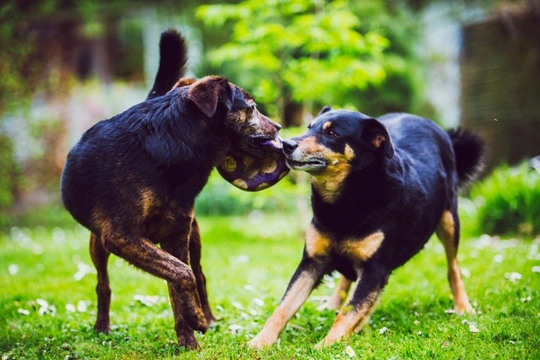
How to avoid jealousy and competition between dogs that live together
Dogs are very social animals that greatly value the company of their own kind as well as that of people, and so a great many dog lovers make the decision to own two (or more) dogs rather than just one. Whether this means getting a pair of siblings, buying or adopting two unrelated dogs together or introducing a new dog into an existing dog’s home, even dogs that know each other well and generally get on can become jealous of each other if you don’t manage things properly.
Treating both dogs fairly and ensuring that they get an equal share of your time and resources is of course vitally important – but you also have to accept that in any relationship between two or more dogs, there will be a distinct hierarchy in which every dog knows their role, and works within it, which is the way that dogs naturally interact and communicate with each other without human intervention.
In many cases of dog jealousy, it is inadvertently the human owner or handler who creates the issue in the first place, and regardless of the cause, it is the role of the dog’s owner or handler to resolve the issue and re-establish the appropriate status quo.
In this article, we will look at why dogs get jealous of each other, how to prevent this from happening, and how to resolve jealousy between dogs that live together. Read on to learn more.
Competition and jealousy between dogs
When you own two or more dogs, it is important to ensure that you have enough time and resources to care for them both properly – and this doesn’t just mean attending to their physical needs, but emotional needs as well. You should spend equal amounts of time with both dogs and give them equal amounts of affection, spending time with each dog individually as well as doing things with them together.
However, if you have one dog that cannot seem to handle seeing the other dog getting attention or resources without pushing themselves into the mix or getting pushy with the other dog, this is something that you will need to address.
Dogs often compete with each other even if they get on well – such as racing each other to catch a ball, or be the first out of the door for walks. However, if one of your dogs is snappy, overly dominant or pushy with the other dog, this may be because they are feeling insecure about your relationship with the other dog, or because there is an imbalance in resources or the balance of the pack structure itself.
The pack structure between dogs and people
Trying to interfere with the natural hierarchy that dogs establish between themselves is apt to cause problems, as the more dominant dog will work to restore the balance. Accepting that one dog will be in charge and the other will be second in line is a normal part of dog ownership, so try not to interfere when your dogs communicate with each other and find their respective places in their own pack, unless one of them is getting aggressive or being overly pushy.
If the more dominant dog acts out when you show attention to the other dog or otherwise tend to their needs, the chances are that they don’t respect your place at the top of the pack hierarchy, and are attempting to subvert it by pushing in and dividing your attention.
Working with the pack structure rather than against it – greeting the dominant dog first, feeding them first and so on – helps to establish your dogs’ relationships with both each other and with you, which in turn, reduces flash points and battles over dominance and resources.
Providing sufficient resources
If your dogs have to compete with each other for resources, there will be jealousy – and the dog lower down in the hierarchy will often miss out. It is important to provide for all of your dog’s needs, and to do so equally – both dogs should have toys and beds of their own, as well as time dedicated to being spent with you on a one to one basis.
Food and treats are very important to dogs, and so jealousy and competition is apt to be particularly acute when resources of this type are involved, but good training and management can help here.
Make sure that both of your dogs are well mannered about mealtimes and are made to sit and behave nicely before having a treat – and that trying to push the other dog out of the way or steal their treat is not allowed. If the dominant dog eats quickly and steals the other dog’s food or attempts to scare them off, you will need to supervise mealtimes, or feed the two dogs separately.
Additionally, allow each dog their own space so that they have a place to retreat to when they want to, such as their own crate or bed that they don’t have to share.



